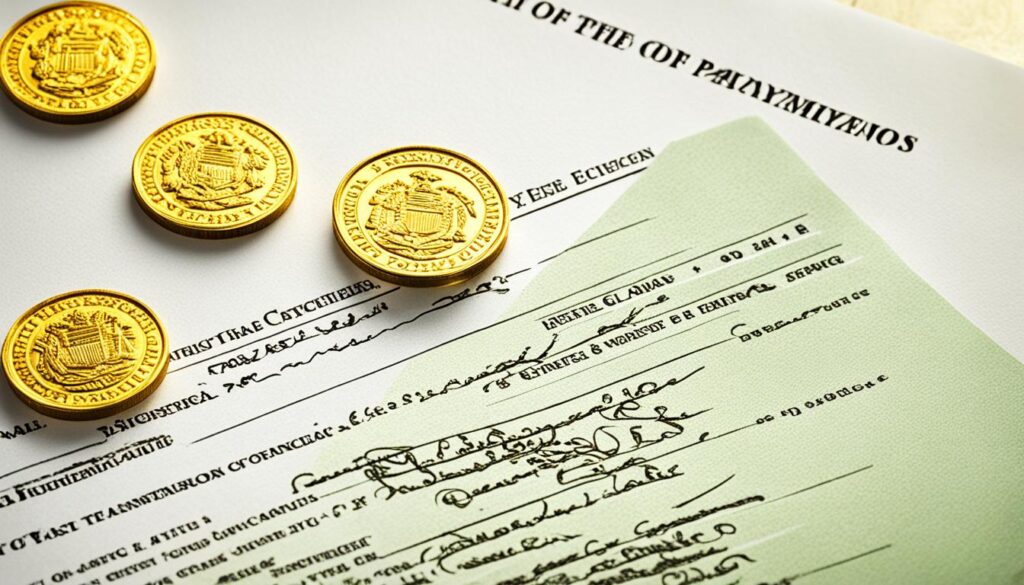Hiring a probate attorney is crucial in dealing with a loved one’s estate. They are experts in guiding you through a complex legal process. This process involves understanding the Texas Estates Code, settling arguments, and working with the probate court. They help value assets, pay debts, and give out the estate to rightful people.
A skilled probate attorney brings knowledge, practical skills, and support during this hard time. They help interpret your relative’s will or trust. They make sure you follow state laws and manage the distribution of assets. A probate lawyer is a great partner in the journey of estate administration.
Key Takeaways
- Probate attorneys help navigate the complex legal process of estate administration, including resolving disputes, communicating with the probate court, and distributing assets to beneficiaries.
- Experienced probate lawyers can provide expertise, practical abilities, and emotional support throughout the probate process.
- Probate attorneys can assist with interpreting wills and trusts, ensuring compliance with state laws, and handling the distribution of complex assets.
- Hiring a probate attorney can help avoid delays and mistakes in court proceedings, which can be costly and time-consuming.
- The role of a probate lawyer extends beyond just the probate process, including tax planning, special needs planning, and ensuring estate plans comply with legal requirements.
Understanding the Role of a Probate Attorney
Probate attorneys help with the complex legal steps after someone passes away. They know the laws well and can help the estate’s representatives with many tasks. This includes court filings, meeting deadlines, and following required procedures.
Navigating Complex Probate Laws
Probate law is full of different rules and needs, varied by state. Probate attorneys use their special knowledge to make sure everything is done right. They protect the estate’s interests and those who will inherit, understanding the fine points of the law.
Representing the Interests of Beneficiaries
Per law, probate attorneys take charge of helping the estate’s beneficiaries. They ensure the deceased’s wishes are honored while making sure everyone involved is treated fairly. With their help, conflicts are lessened, and the rights of those inheriting are looked after.
Probate attorneys are key in leading executors and administrators through the complex probate laws, making sure all comply and protecting beneficiaries’ interests.
| Key Probate Attorney Responsibilities | Probate Law Expertise |
|---|---|
|
|
They use their expertise in probate law and their duty to ensure the probate process is fair for everyone. This keeps the process moving smoothly and protects the interests of all parties involved.
Initiating the Probate Process

The probate process begins by filing a probate petition and the decedent’s will in court. A probate attorney often takes this first step. They make sure all paperwork is right. This makes navigating the complex legal world easier for executors.
Identifying and Valuing Estate Assets
Probate attorneys help executors find and value the decedent’s assets. This includes things like real estate, investments, and personal items. It’s important to know the value of these items for dividing them correctly and for tax reasons.
Accounting for Various Asset Types
- Real estate, such as the decedent’s primary residence or investment properties
- Financial assets, including bank accounts, stocks, bonds, and retirement accounts
- Personal possessions, such as vehicles, jewelry, artwork, and collectibles
- Business interests, including ownership shares or intellectual property
Determining Fair Market Value
Finding the fair market value of assets is key. Probate attorneys work with experts like appraisers. They also use accountants to get the value right. This helps with paying off debts, working out estate taxes, and giving assets to beneficiaries in the end.
“The probate process in California helps authenticate wills, pay off creditors, and ensure the rightful distribution of estate assets to beneficiaries or heirs.”
Notifying Creditors and Settling Debts
A probate attorney’s key job is to tell the dead person’s debt holders and help pay off what’s owed. This includes many steps that are critical to protect the estate’s and its owners’ interests.
First, the attorney finds and tells everyone that the dead person owed money to. This means telling those who loaned money for houses or cars, and those who gave credit cards or personal loans. They also let anyone know who might have a claim against the estate.
In California, certain debt holders get paid before others if there’s not enough money to cover all debts. Attorneys have to carefully handle telling creditors and settling debts. This ensures the estate pays what it owes before giving anything back to the owners.
But it’s not just about telling people; the attorney also helps assess the value of what the dead person left behind. Knowing this helps in talking to creditors and deciding how to use the assets to pay debts.
“Creditors should be vigilant in monitoring debtors and enlist legal help promptly upon notification of a debtor’s death.”
Probate firms can locate other assets not handled by a will and help in cases where debt repayment is a challenge. They work hard to make the process smooth and avoid fights or delays in running the estate.
Probate attorneys are crucial in making sure the estate’s debts are paid fairly. Their skill and effort help make sure the dead person’s belongings are shared without trouble.
what to expect from a probate attorney

A probate attorney is key in the probate process. They keep you informed every step of the way. They tell you about the case’s progress and answer your questions fast. Your attorney also makes sure everyone knows what they need to do.
Probate attorneys are great at solving family arguments that can come up. They work to settle fights over the will or assets without going to court. They use talks or other ways to find peace. This saves money and time.
“Effective communication and conflict resolution are essential when navigating the complexities of probate. A skilled probate attorney can guide you through this process, ensuring your interests are protected and your family’s needs are met.”
With a good probate attorney, the process will be easier. They focus on keeping things clear and solving problems well. Your attorney will support you, helping to make the process fast and not stressful.
Maintaining Clear Communication
Your probate attorney must talk with you openly. Here’s what they should do:
- Keep you updated on the probate case
- Listen and answer your questions quickly
- Break down the legal stuff so you understand
- Make sure everyone knows what they have to do
Resolving Conflicts and Disputes
Probate can get tough, causing fights among family or those involved. Your attorney should know how to deal with this. They use ways like:
- Mediation: Helping everyone talk and agree
- Arbitration: Getting a fair, outside decision
- Negotiation: Finding a middle ground that works for all
Thanks to their skills in talking and fixing fights, your attorney can make the process peaceful. This way, probate issues can get sorted out without trouble.
Interpreting Wills and Trusts
Probate attorneys are key in making sense of estate planning documents like wills and trusts. They help executors and beneficiaries understand the person’s real wishes. This includes explaining confusing parts, sorting out differences in documents, and making sure everyone gets what’s rightfully theirs.
Understanding the Decedent’s Intentions
Probate attorneys are knowledgeable in will and trust interpretation. They use this and their grasp of the decedent’s estate planning documents to find out what the person really meant. This helps them lead executors and beneficiaries through the often tricky probate process. They make sure the deceased’s final requests are met.
Finding and understanding pour-over clauses in wills is a common task for probate attorneys. These clauses move any leftover possessions to a living trust. This makes it easier to handle and spread out the estate. Their skill in this field ensures the will and trust work together smoothly.
Probate attorneys also look into parts of the will that name guardians for minor kids and set up testamentary trusts. These safeguards protect those who can’t look after themselves, ensuring their inheritances are managed well.
They also help with no-contest clauses in wills. These clauses discourage fights over the will. Understanding these clauses lets executors and beneficiaries skip expensive, long legal battles. This keeps the deceased’s will solid.
Probate attorneys’ knowledge in will and trust interpretation is vital. It guides executors and beneficiaries. They help in handling the deceased’s estate how they wanted, as shown in the estate planning documents.
Handling Estate Taxes and Filing Returns

Estate administration is tricky, but probate attorneys are experts who help with the tax side of things. They spot any estate or inheritance taxes that need to be paid. Then, they make sure all tax forms are correctly filled and submitted on time. They also team up with tax pros to cut down the total taxes due. This advice makes sure the estate gets settled correctly, speeding up when beneficiaries get what they’re owed.
One big job for a probate attorney is handling the decedent’s last tax return and any they missed before dying. They collect important papers, like W-2s or 1099s. They make sure every tax bill is cleared. They also handle the estate’s tax returns, which can need doing for years until everything’s shared out.
When it’s about estate taxes, the attorney looks into if state or federal taxes apply. For the 2023 tax year, estates over $12.92 million face federal tax. State tax rules are different in each state. The attorney sees to it that the right tax paperwork is filed and all dues are paid to avoid penalties.
The probate attorney is there every step of the way, making sure the estate’s legal rep meets all the tax duties. They help get important IDs for the estate and work with tax pros. This ensures the estate follows the law and runs smoothly.
Hiring a knowledgeable probate lawyer helps executors and administrators deal with the maze of estate taxes. They ensure everything is done right, getting beneficiaries their due without delay and in a smart tax way.
Resolving Disputes and Litigation
Estate planning and probate often spark disputes and litigation. Probate attorneys help navigate these complicated legal paths. They aim to safeguard beneficiaries’ interests and reach a just settlement.
Contesting a Will
The validity of a will is often questioned. If beneficiaries think a will was made under bad conditions, like undue influence, they might contest it. Probate attorneys use their know-how in estate law to present a strong case for the estate.
Breach of Fiduciary Duty Claims
Claims against executors or trustees for not fulfilling their fiduciary duties can lead to litigation. Executors and trustees must look out for the estate and its beneficiaries. If they don’t, beneficiaries can take legal action. Probate attorneys support these cases, aiming to protect the beneficiaries’ rights.
Navigating through estate disputes and legal fights may seem overwhelming. Yet, with a probate attorney’s experienced help, solving these disputes and ensuring probate’s fairness becomes easier.
| Probate Dispute Type | Common Reasons | Legal Remedies |
|---|---|---|
| Will Contests |
|
|
| Breach of Fiduciary Duty |
|
|
“Hiring a probate attorney can be crucial in navigating the complex legal landscape of estate disputes and ensuring the fair and efficient resolution of any challenges that arise.”
From will contests to fiduciary duty breaches, probate lawyers are up to the task. Their expertise and tireless advocacy for clients’ rights help settle disputes and keep the probate process sound.
Asset Distribution and Estate Closure

The process of distributing assets signals the end of a person’s legal matters after their passing. This step occurs after sorting out debts and disputes. A probate attorney helps divide any remaining assets as the deceased, in their will or trust, directed.
Assets that may be distributed range from personal items like cars and jewelry to financial accounts, stocks, and land. Probate assets cover a broad list of belongings. Meanwhile, non-probate assets include those with specific beneficiary designations or those owned through a trust.
Items not specified in the will for certain people can be shared, sold, or given to the rightful relatives. Any real estate not directly given should be sold. Then, the profit is shared out. Digital assets, such as cryptocurrencies, also need to be handled. They might require experts for correct valuation and transfer.
| Asset Type | Probate vs. Non-Probate |
|---|---|
| Vehicles | Probate |
| Jewelry | Probate |
| Financial Accounts | Probate |
| Accounts with Beneficiary Designations | Non-Probate |
| Trust-Owned Assets | Non-Probate |
| Real Estate with Right of Survivorship | Non-Probate |
It’s the probate attorney’s job to close the estate properly. This includes filing the right documents in court. The exact steps may differ by state. But, it usually means settling any remaining debts and taxes, giving out final assets, and requesting approval for the closure.
Shutting down a probate is a key moment. It officially ends the asset distribution and estate closure steps. After this, though, there could still be a chance for creditors or beneficiaries to dispute how the estate was managed. They might question the executor’s decisions, based on the laws in place.
With the guidance of a knowledgeable probate attorney, executors and beneficiaries can smoothly go through the distribution and closure. This helps ensure the deceased’s final requests are followed properly. It makes the probate process finish without big issues.
Conclusion
The Value of Hiring a Probate Attorney
Hiring a probate attorney is key when facing the tough and often emotional probate process. They offer expert help, practical tips, and support. This aids executors and beneficiaries in fulfilling the deceased’s last wishes. They ensure the estate’s proper and timely distribution by using their knowledge of probate laws and their dispute resolution skills.
Finding the Right Probate Attorney for Your Needs
Choosing the right probate attorney is crucial. Look for one with vast experience in probate law and who has a history of success. Also, their way of communicating should match what you’re looking for. Consider their reputation, qualifications, and fees, alongside their ability to work with your case’s unique aspects. Reaching out to people you trust for recommendations, searching online, and meeting with potential attorneys are good steps to finding the best attorney for your situation.
